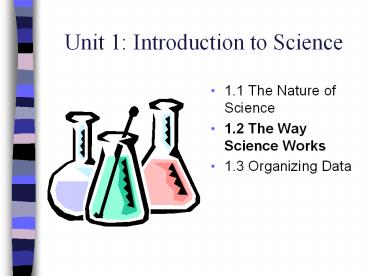Unit 1: Introduction to Science - PowerPoint PPT Presentation
1 / 12
Title:
Unit 1: Introduction to Science
Description:
... Quantity Unit Abbreviation Length Meter m Mass Kilogram kg Time Seconds s Temperature Kelvin K Electric Current Ampere A Amount ... min), hour (hr ) Fahrenheit ... – PowerPoint PPT presentation
Number of Views:55
Avg rating:3.0/5.0
Title: Unit 1: Introduction to Science
1
Unit 1 Introduction to Science
- 1.1 The Nature of Science
- 1.2 The Way Science Works
- 1.3 Organizing Data
2
Important Science Skills
- Identifying problems
- Planning experiments
- Recording observations
- Reporting analyzing data
- Learning to think like a scientist
- Thinking critically
- Critical thinking applying logic and reason to
solve problems
3
Scientific Method a process used to solve
problems
If not, modify hypothesis based on observations.
4
Scientific Method
- Used by EVERYONE, not just scientists!
- There is no single scientific method it is a way
of thinking rather than an exact path for
scientists to follow. - No experiment is a failure!
- Think of Roentgen who accidentally discovered
x-rays.
5
Experimental Parts
- Control part of experiment that stays unchanged
considered normal - Experimental Group a group of subjects exposed
to the variable
6
Experimental Parts
- Variable part of the experiment that varies.
- Test only one variable at a time.
- Why? Otherwise, it is harder to make reliable
conclusions.
7
Types of Variables
- Independent variable variable that changes to
see what happens - Dependent variable depends on independent
variable may change because of independent
variable. - Example The size of tomatoes depends on the
amount of sun they receive. - Independent variable Amount of sun
- Dependent variable Size of tomatoes
8
Units of Measurement
- Scientists use the International System of Units
(abbreviated SI units) - Why? Then, no matter where you are in the world,
sharing data is much easier for scientists.
9
SI Base Units
Quantity Unit Abbreviation
Length Meter m
Mass Kilogram kg
Time Seconds s
Temperature Kelvin K
Electric Current Ampere A
Amount of substance Mole mol
Volume Cubic meter m3
10
SI Base Units (continued)
Other Units
Millimeter (mm), centimeter (cm), inch (in), feet
Gram (g), milligram (mg)
Millisecond (ms), minute (min), hour (hr)
Fahrenheit (F), Celsius (C)
Milliampere (mA)
Millimole (mmol)
Cubic centimeter (cm3), milliliter (mL), liter (L)
11
Making Measurements
- Length straight line distance between 2 points
- Mass amount of matter in an object
- Volume how much space something takes up
- Weight force with which gravity pulls on matter
12
Science Buzzwords
- Bias unfair prejudice towards a particular
opinion - Ethics a set of principles that guide
decision-making whether something is morally
right or wrong































